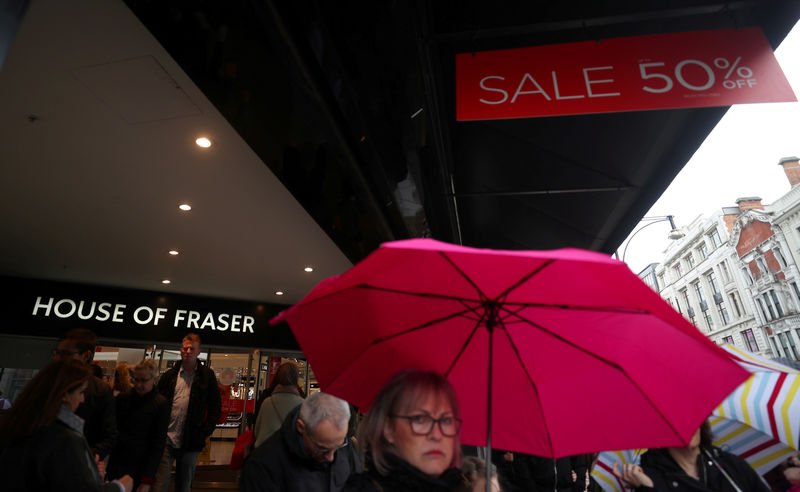Investing.com’s stocks of the week
By William Schomberg and Paul Sandle
LONDON (Reuters) - Britain's consumers picked up the pace of their borrowing in April, according to data that could reassure the Bank of England that the economy is ready for another interest rate hike after a cold winter slump.
Also on Thursday, surveys showed consumers turned a bit more confident this month, possibly reflecting an easing of a Brexit-related squeeze on their spending power, and companies were more upbeat too.
"The figures will give the Monetary Policy Committee increased confidence in their assessment that the Q1 slowdown was just a blip," Andrew Wishart, an economist with consultancy Capital Economics, said.
"The figures chime with other signs that consumer spending growth is starting to strengthen, such as strong retail sales in April. And the rise in consumer confidence in May suggests that consumer credit growth will continue to grow strongly."
Britain's economy, which has slowed sharply since voters decided in mid-2016 to leave the European Union, nearly ground to a halt in the first three months of 2018, when the country was hit by unusually cold weather.
The slowdown prompted the BoE to hold off from raising interest rates this month. It noted the sharp fall in consumer borrowing when it explained why it kept rates on hold.
Thursday's data from the BoE showed consumer credit jumped by a bigger-than-expected 1.832 billion pounds, the strongest rise since November 2016, up from an increase of only 425 million pounds in March.
Economists taking part in a Reuters poll had expected consumer lending to show a net increase of 1.3 billion pounds.
The annual growth rate in consumer lending edged up to 8.8 percent from 8.6 percent in March, its slowest increase since November 2015, the BoE said.
A surge in consumer credit peaked in late 2016 when it was growing by 11 percent a year.
Since then, the BoE has urged banks to scale back risky lending, and consumers have felt the pinch from higher inflation after the Brexit vote and weak wage growth.
But there are signs that the squeeze on spending power is easing. Inflation has eased in recent months and wage growth is slowly picking up speed.
The monthly GfK consumer confidence survey showed households felt more upbeat about their personal finances although the remained largely pessimistic about the economy ahead of Brexit next March.
In contrast to the signs of a pickup among consumers, Britain's housing market remains in the doldrums.
Prices rose by 2.4 percent in the 12 months to May, down from rates of around 5 percent shortly before the referendum, mortgage lender Nationwide said.
The BoE said the number of mortgages approved for house purchase edged down to 62,455 in April from 62,802 in March, below economists' forecasts of 63,000 in the Reuters poll.
